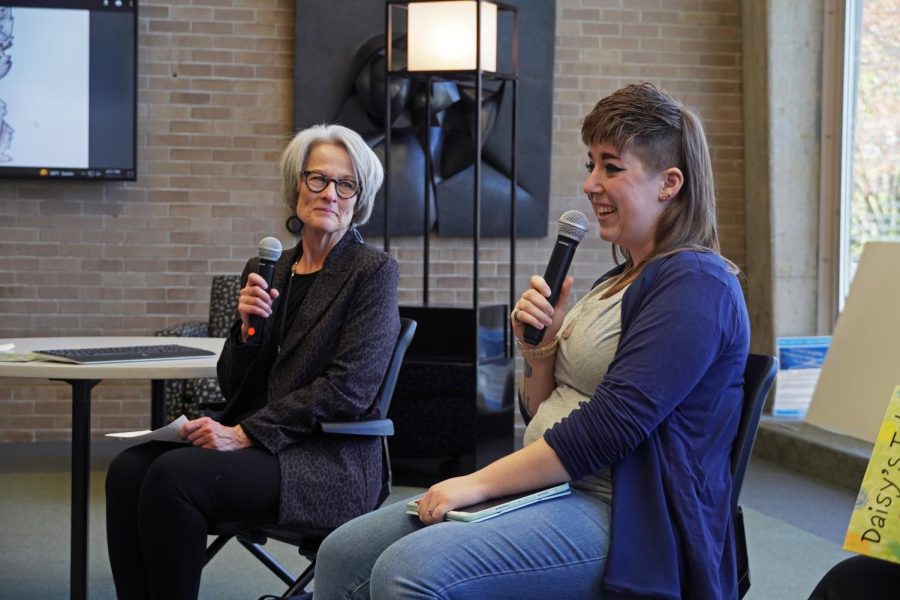Tommy Hexter `21 became one of the only Grinnell College students to ever hold public office while still attending the College on Nov. 25, 2020 when he was elected to the Poweshiek County Soil and Water Conservation District. Since then, Hexter, along with his four fellow commissioners, has been in charge of protecting and managing the county’s soil and water.
Hexter’s upbringing on a two-acre vegetable and egg farm in Virginia led him to become environmentally- and food-conscious at a young age. Though his parents both worked as librarians rather than farmers, farming was always a central part of his childhood – a part of his childhood that he didn’t view as unordinary until he was much older.
“I guess I just didn’t realize it was weird to have scooped chicken manure on my shirt from picking up six dozen eggs,” said Hexter, “so I didn’t talk about it much in school.”
When he came to Grinnell in August 2017, Hexter wasn’t planning to become as involved in Grinnell’s food culture as he’d end up being. But soon after he arrived on campus, Hexter felt that there was a lack of place-based learning within Grinnell, which he characterizes as an educational approach which uses the local environment as a context for learning. In 2018, he co-founded Farm House, a residential project house for Grinnell students who are dedicated to sustainable agriculture.
“It soon became very clear to me how central food and agriculture is to the communities and to the landscape here,” Hexter said. It was his desire to protect the Iowa environment that led him to run an independent campaign for commissioner last fall, becoming the fifth, and youngest, commissioner in the Conservation District.
Hexter said that his number one priority during his four-year term is to bring more cultural diversity to the farming community in Poweshiek county and also to promote more biological diversity within the Iowa landscape. Hexter said he believes that these two goals are intertwined, since the more diverse the farming community becomes, the less monolithic its collection of crops will become as well.
Hexter pointed to the U.S. Natural Resources Conservation Service (NRCS), which provides grant programs like the Socially Disadvantaged Groups Grant, which offers assistance to farmers from marginalized groups, as an organization which contributes to these goals.
Every state receives $3 million in funding from the U.S. NRCS for the grant, but according to Hexter, the Iowa NRCS does not prioritize the administration of the grant because 99 percent of Iowa farmers are white. (The S&B could not independently verify the status of the program’s administration.)
Still, because the amount of funding is fixed by the U.S. NRCS, the Conservation District commissioners lack the authority to improve the availability of these programs for Poweshiek County residents.
“The only thing we really have power to do is to educate and connect farmers to the conservation programs,” said Hexter.
One thing that the Conservation District commissioners may be able to do to protect Poweshiek County’s ecosystem is monitor the nitrate levels in the English River. Last summer, McNulty Pork LLC began construction on a new Concentrated Animal Feeding Operation (CAFO), which will cause wastewater and hog manure into the river, Hexter said.
A CAFO is an intensive farming operation in which over 1,000 animal units are confined for more than 45 days within each year, and which distributes its manure or wastewater into natural or man-made waterways. The Center for Disease Control has found that CAFOs often causes groundwater contamination which can lead to nitrate poisoning for residents. As of 2020, there are more than 50 CAFOs within Poweshiek County. McNulty’s is the newest one.
Hexter has said he stands firmly against the creation of new CAFOs across all of Iowa, and has worked with the group Poweshiek CARES, who advocates against the creation of new CAFOs by advocating for the passage of Iowa House File 440, which would place an indefinite moratorium on the creation of CAFOs in Iowa.
Ultimately, he said his inability to halt the construction of CAFOs within Poweshiek County comes from the lack of power that commissioners hold. Hexter described the primary problem of serving on the Conservation District as the lack of control the District has over its local environment. The U.S. and Iowa Department of Natural Resources have jurisdiction over the regulation of CAFOs, so any potential end to CAFOs rests within state or federal bodies – not local ones.
“We have elected officials in each county who are meant to be the ones on the ground making sure the soil and water is healthy,” Hexter said. “But if you don’t have any control over the introduction of a new factory farm – which is going to dump millions of pounds of manure onto the ground each year – then you can’t actively fulfil your duty as commissioner.”
Hexter urged Grinnellians to take action in protection of the local ecosystem. The first step, he said, is to support local food-growers like Grinnell Heritage Farm. But more importantly, Hexter said he wants Grinnellians to realize that the ability to transform the Iowa landscape lies with them.
“It’s a very special place. It’s easy to ignore the fact that it’s being destroyed, but we gotta do something,” he said. “Get involved in the landscape and go get your hands in the soil one way or another.”




























































